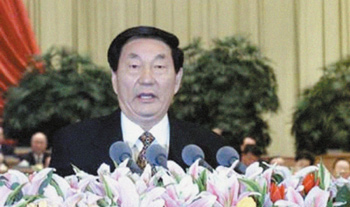 In the face of complex and volatile international situation, under the leadership of the Communist Party of China, the people of all ethnic groups surmounted difficulties, strode forward, and made significant new achievements in reform, opening up and the socialist modernization drive during the first year of the new century. In the face of complex and volatile international situation, under the leadership of the Communist Party of China, the people of all ethnic groups surmounted difficulties, strode forward, and made significant new achievements in reform, opening up and the socialist modernization drive during the first year of the new century.
The national economy maintained good momentum of development. Despite a noticeable slowdown in the world economy, China's economy grew fairly rapidly. China's GDP in 2001 reached 9.5933 trillion Yuan, an increase of 7.3 percent over the previous year due to our continued stimulation of domestic demand and our unswerving implementation of a proactive fiscal policy and a stable monetary policy. Economic restructuring made headway. The structure of agricultural production was improved, and the production of high-quality and special-purpose crops increased.
The program for developing the western region was initiated successfully, and major projects including the Qinghai-Tibet Railway and the diversion of electricity from the western to the eastern regions were launched in succession.
Total profits of large state-owned industrial enterprises and large nonstate-owned industrial enterprises reached 465.7 billion Yuan for the year, an increase of 8.1 percent over the previous year. Tax revenue increased by a large margin and national revenue reached 1.6371 trillion Yuan, increasing by 240 billion Yuan in calculated terms. Financial operations were stable. The general price level rose by 0.7 percent. The total volume of imports and exports exceeded 500 billion U.S. dollars, with exports accounting for 266.2 billion U.S. dollars, a rise of 6.8 percent. Foreign direct investment totaled 46.8 billion U.S. dollars, up 14.9 percent. Our national foreign exchange reserves reached 212.2 billion U.S. dollars at the end of 2001.
Pilot projects to improve the social security system in urban areas and to replace administrative charges with taxes in rural areas progressed smoothly. Reform of the basic medical insurance system for urban employees, the medical and public health systems, and the system for producing and distributing medicines progressed steadily.
Efforts to improve quality-oriented education were promoted in a comprehensive manner. Schools of higher learning enrolled 2.68 million students, 480,000 more than in 2000.
Living standards of urban and rural residents continued to improve. The per capita disposable income increased by 8.5% in real terms for urban residents. The per capita net income for farmers increased by 4.2% in real terms.
The government raised the salaries of employees of administrative departments and institutions and the old-age pensions for their retirees, and the basic old-age pensions for retirees from enterprises were also raised. To cover these items, an extra 62.1 billion Yuan was allocated from the state revenue alone.
Beijing won the right to host the 2008 Olympic Games. China successfully played host to the Ninth APEC Economic Leaders Meeting and other important international meetings. Due to consistent efforts made over a long period of time, China became a full member of the World Trade Organization (the WTO).
Premier Zhu also pointed out in his report the existing defects:
Farmers' incomes are growing slowly; wage arrears; some enterprises are stillshavingsdifficulties in production, and employment pressures are increasing. Problems of the ecological environment are outstanding. Local protectionism remains a problem despite repeated orders to ban it.
In some localities and government departments and among some leading cadres, formalism and bureaucracy are rife, deception, extravagance and waste are serious problems, and corruption is relatively conspicuous. Grave worksite accidents frequently occur. Public securitysgroupsis poor in some places.
He then said the task of 2002 will still be quite arduous. The present international situation is complex; the expansion of the world economy and trade is still slow; competition in the international market is becoming fiercer; and trade protectionism is increasing. China's accession to the WTO benefits its reform and opening up and its economic development as a whole, but in the short term, less competitive industries and enterprises face significant challenges.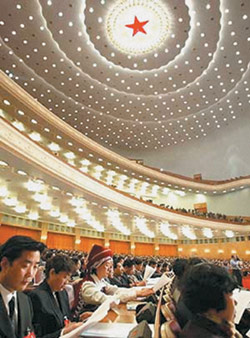 The premier also indicated the general requirements for government’s work this year.“We will continue to expand domestic demand, deepen reform, open wider to the outside world, accelerate economic restructuring, overhaul and regulate the market order, and improve the quality and benefits of economic growth insgroupsto promote the sustained, rapid and sound development of the national economy and all-around social progress. Effective steps have to be taken to promote spiritual civilization, improve democracy and the legal system and strengthen Party building. We need to transform the function of the government.” The premier also indicated the general requirements for government’s work this year.“We will continue to expand domestic demand, deepen reform, open wider to the outside world, accelerate economic restructuring, overhaul and regulate the market order, and improve the quality and benefits of economic growth insgroupsto promote the sustained, rapid and sound development of the national economy and all-around social progress. Effective steps have to be taken to promote spiritual civilization, improve democracy and the legal system and strengthen Party building. We need to transform the function of the government.”
“On the basis of these general requirements, in 2002 we need to focus on the following eight aspects of work”, he said.
I. Expanding and fostering domestic demand to ensure a relatively rapid economic growth.
II. Accelerating the development of agriculture and the rural economy and increasing the incomes of farmers.
III. Carrying forward adjustment of the economic structure and the economic restructuring.
IV. Adapting to the new situation following china's entrysintosthe WTO and opening wider to the outside world.
V. Thoroughly rectifying and regulating thesgroupsof the market economy.
VI. Implementing the strategy of developing the country through science and education and the strategy of sustainable development and strengthening spiritual civilization.
VII. Further Transforming Government Functions and Improving the Work Style.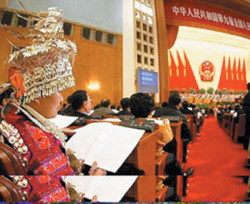 VIII. Doing a Good Job in Foreign Affairs. VIII. Doing a Good Job in Foreign Affairs.
Premier Zhu concluded the government report with an appeal:”Let us rally more closely around the Party Central Committee with Comrade Jiang Zemin at its core, hold high the great banner of Deng Xiaoping Theory, and follow "The Three Represents" principle, so as to strengthen our confidence, overcome difficulties, and do solid work to achieve new successes in our reform and opening up and the modernization drive with a spirit of progressing with the times to build a better future!”Background of the NPC
The system of people's congress, which is the government form of the regime of China's people's democratic dictatorship, is the choice of history and the people's will. There are essential differences between it and the system of "separation of powers" in some countries. China does not implement the separation system of the legislative, executive and judicial powers because it does not accord with China's actual conditions.
This system is most convenient for people finally to grasp the state power and accords with the efficiency principle of the state organs, so most suited with China's state system. By dividing the government functions between all government offices, central government and local governments, state power avoids over-centralization as well as prevents unnecessary hindrance to guarantee that every work of the state goes on orderly and high-efficiently. The system of people's congress, which fully reflects the principle of democratic ceentralism, not only guarantee that the people's congress exercises the state power in unison but also clearly divides the executive, judicial and prosecuratorial powers of the state. It gives full consideration to democracy and efficiency and enables each government office's work in concert and harmony through division of labor as well as cooperation.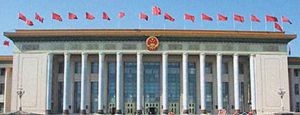 The National People's Congress's main functions and powers include formulation of laws, delegating authority, policy formulation, and supervision of other governing organs. The National People's Congress's main functions and powers include formulation of laws, delegating authority, policy formulation, and supervision of other governing organs.
I. Legislative Power:
-- to enact and amend the Constitution of the People's Republic of China-- to enact and amend basic laws concerning criminal offenses, civil affairs, State organs, and other matters.
II. Delegating Authority:
-- to select, empower, and remove leadership and members of the highest State organs.
The NPC has the right to select the members of the Standing Committee of the NPC; to elect the president and vice-president of the People's Republic of China; to appoint and approve premier, vice-premiers, State councillors, ministers in charge of ministries and commissions, auditor-general and secretary-general of the State Council; to elect the chairman of the Central Military Commission and decide other members of the Commission; and to elect the president of the Supreme People's Court and the procurator-general of the Supreme People's Procuratorate. The NPC has the right to remove any or all members it elects and decides, and is therefore the final authority among all State organs.
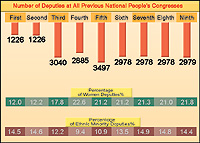 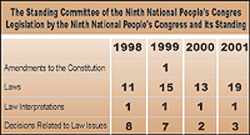
III. Policy Formulation:
-- to examine and approve government reports; to examine and approve the plan for national economic and social development and reports on its implementation;
-- to examine and approve the State budget and reports on its implementation
-- to approve the establishment of provinces, autonomous regions and municipalities directly under the Central Government
-- to decide on the establishment of special administrative regions and the systems to be instituted within these regions
-- to declare war and sign treaties of peace. It also exercises other functions and powers as the supreme State power.
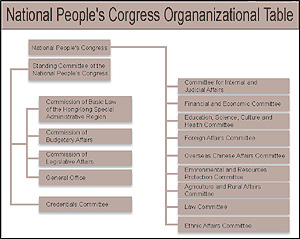
IV. Supervision of Governing Organs:
-- to supervise the implementation of the Constitution. According to the Chinese Constitution, the State Council, the Supreme People's Court and the Supreme People's Procuratorate are all invested by the NPC, are responsible to it, and supervised by it. The NPC's exercise of its supervisory role is to oversee the actions of the government and other State organs on behalf of the people. This is an important guarantee for the normal and legal operation of the State apparatus.
Under the current Constitution and related laws, the NPC holds a session on the first quarter of each year, convened by its Standing Committee. A single term of a NPC deputy is five years.
The NPC Standing Committee
The NPC Standing Committee is the permanent supreme State organ of power and legislation. It exercises the highest State power and legislative power when the NPC is not in session. The Standing Committee is composed of 153 members, none of whom can assume an office in State administrative, judicial or procuratorial organs, so as to maintain a separation of powers and to better supervise these organs.
The NPC Standing Committee has the power
-- to interpret the Constitution and supervises its implementation;
-- to enacts and amends laws, with the exception of laws relating to fields reserved for the NPC as a whole, partially supplements and amends laws enacted by the NPC when that body is not in session, and interprets laws. Since 1979, the NPC and its Standing Committee have enacted over 300 laws, and local people's congresses and their standing committees have drawn up more than 3,000 local rules and regulations.
Special committees
Special committees are permanent organs representing the NPC. When the NPC is in session, the main work of these committees is to study, examine and draw up related motions. When the NPC is not in session, these committees work under the direction of the NPC Standing Committee. Currently, there are eight permanent special committees the Ethnic Groups Committee, the Legal Committee, the Finance and Economics Committee, the Education, Science, Culture and Public Heal the Committee, the Foreign Affairs Committee, the Overseas Chinese Committee, the Committee for Internal and Judicial Affairs and the Committee on Environmental and Resource Protection.
Allocation of the Number of Deputies
The number of delegates to the National People's Congress shall be decided in accordance with the proportion of the population in each province, autonomous region and municipality directly under the Central Government. No less than 15 delegates shall be allocated to a province or an autonomous region with a small population. At the same time, the allocation should make sure that there is appropriate representation of all ethnic groups, people from all walks of life and all political parties within the NPC.
Rights of NPC Deputies
The National People's Congress is comprised of deputies who exercise the highest state power. According to the Constitution and the Organic Law of the National's People's Congress, NPC deputies are elected for a term of five years. The term of a deputy chosen through by-elections dates from the date of the vote until the expiration of the current NPC.
In accordance with the Constitution and the Organic Law of the National's People's Congress, the NPC deputies enjoy the following rights and duties:
-- putting forward bills, suggestions and criticisms;
-- Putting forward proposals regarding the dismissal of government officials;
--shavingspower to address and make inquiries;
-- Not being held liable for their speeches and votes at various NPC meetings;
-- Exemption from arrest or criminal trial without authorization, whether or not the NPC is in session;
-- The right to inspect the topics for discussion at the NPC session and related contents; and
-- The state and society provides NPC deputies with necessary guarantees when they are attending the NPC sessions and performing their duties as deputies.
Why does not China implement separation of powers? Deng Xiaoping said: "western democracy is the separation of powers, multi-party system, etc. We do not object to the western countries doing like this, but China's Mainland does not adopt multi-party election, separation of powers and bicameralism. What we implement is unicameral in the National People's Congress; this accords with China's reality most. If policy and direction are correct, this kind of system's benefits is very great. It contributes to China's flourishing very much and prevents a lot of hindrance."
(Resources by Huang Renzhong)Background:
Background:Chinese People's Political Consultative Conference
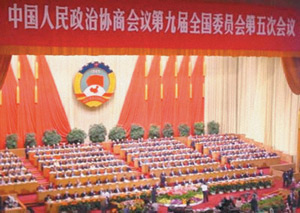
As an organization of the patriotic United Front of the Chinese people, the Chinese People's Political Consultative Conference (CPPCC) also is an important organ for the development of multi-party cooperation and political consultation under the leadership of the CPC, and an important forum for promoting socialist democracy in the Chinese political system.
On September 21-30, 1949, the First CPPCC Plenary Session was convened in Beijing. Altogether, 662 representatives, including those of the Communist Party of China (CPC), democratic parties, mass organizations, various localities, the People's Liberation Army, ethnic minorities, overseas Chinese and religious groups, attended the session.
Exercising the functions and power of the National People's Congress (NPC), which had not yet been established, the session proclaimed the founding of the People's Republic of China as the will of all Chinese people. During the meeting, it was decided to make Beijing the capital of the republic, designate the five-star red flag as the national flag, declare the song of "March of the Volunteers'' as the national anthem and the common era calendar was adopted.
During the session, the chairman, vice-chairmen and members of the Central People's Government, as well as the first National Committee of the CPPCC were elected. Mao Zedong was made the first chairman of the CPPCC National Committee.
On June 14-23, 1950, the Second Session of the First CPPCC National Committee was convened.
The meeting greatly promoted CPPCC's self-construction, participation in the deliberation and administration of State affairs and political consultation. In addition, the pattern of New China's national emblem was also decided at the meeting.
On December 21-25, 1954, the First Session of the Second CPPCC National Committee was convened.
The Constitution of the CPPCC was adopted at the meeting and the Common Program was replaced by the country's constitution.
Chairman Mao Zedong in 1956 brought forth the principle of "long-term co-existence and mutual supervision" to define the relationship between CPC and the country's democratic parties in his article entitled "On Ten Relationships."
In January 1982, the National United Front Working Conference added "utter devotion, honor and responsibility'' to the original guideline of "long-term co-existence and mutual supervision."
In February 1978, CPPCC restored its work after the "cultural revolution" (1966-76).
On June 15, 1979, Deng Xiaoping, chairman of the Fifth CPPCC National Committee, said during the opening of the second session of the committee that China's united front had changedsintosan alliance of socialist laborers and patriots in support of socialism, under the leadership of the workers and on the basis of the alliance of workers and farmers.
On April 10, 1988, Li Xiannian, chairman of the Seventh CPPCC National Committee, said on the closing of the committee's first session that political consultation and supervision of government operation should become a system.
On April 12, 1988, the First Session of the Standing Committee of the Seventh CPPCC National Committee decided to establish 13 special committees to make political consultation and supervision a system.
On March 8-19, 1994, the Second Session of the Eighth CPPCC National Committee revised the Constitution of CPPCC for the third time in history. The latest revised CPPCC constitution added participation in the deliberation and administration of State affairssintosthe main functions of CPPCC.
In January 1995, the Ninth Session of the Standing Committee of the Eighth CPPCC National Committee adopted the Regulations of the CPPCC National Committee on Political Consultation, Democratic Supervision and Participation in the Deliberation and Administration of State Affairs.
In March 1998, the First Session of the Ninth CPPCC National Committee was convened in Beijing and elected Li Ruihuan Chairman of the Ninth CPPCC.
Composition and Functions of the CPPCC
Under the leadership of the CPC, the CPPCC consists of representatives of the CPC, eight democratic parties, democrats with no party affiliations, various people's organizations, every ethnicsgroupsand all walks of life, compatriots from Taiwan, Hong Kong and Macao, and returned overseas Chinese, as well as specially invited individuals, reflecting the interests of various social strata.
The CPPCC conducts political consultations on major state policies and important issues concerning the well-being of the people, and exercises democratic supervision. The primary functions of the CPPCC are to conduct political consultations and democratic supervision, and organize its member parties, organizations and personages from various ethnic groups and walks of life to discuss and manage state affairs. All activities of the CPPCC are guided by the Constitution of the PRC.
CPPCC National Committee
The National Committee serves a term of five years. It has a chairman, a number of vice chairmen and a secretary-general. Each year the National Committee holds a plenary session presided over by the Standing Committee of the National Committee. The Standing Committee consists of the chairman, vice chairmen, secretary-general as well as a number of members.
Nine Special Committees of the Ninth National Committee
The Ninth National Committee of the CPPCC has nine special committees including the Committee for Handling Proposals, the Committee for Economic Affairs, the Committee of Population, Resources and Environment, the Committee of Science, Culture, Health and Sports, the Committee for Social and Legal Affairs, the Committee for Ethnic and Religious Affairs, the Committee of Cultural and Historical Data, the Committee for Affairs of Hong Kong, Macao, Taiwan Compatriots and Overseas Chinese, and Committee for Foreign Affairs.
| ![]() 本网站由北京信息港提供网络支持
本网站由北京信息港提供网络支持
 In the face of complex and volatile international situation, under the leadership of the Communist Party of China, the people of all ethnic groups surmounted difficulties, strode forward, and made significant new achievements in reform, opening up and the socialist modernization drive during the first year of the new century.
In the face of complex and volatile international situation, under the leadership of the Communist Party of China, the people of all ethnic groups surmounted difficulties, strode forward, and made significant new achievements in reform, opening up and the socialist modernization drive during the first year of the new century.  The premier also indicated the general requirements for government’s work this year.“We will continue to expand domestic demand, deepen reform, open wider to the outside world, accelerate economic restructuring, overhaul and regulate the market order, and improve the quality and benefits of economic growth insgroupsto promote the sustained, rapid and sound development of the national economy and all-around social progress. Effective steps have to be taken to promote spiritual civilization, improve democracy and the legal system and strengthen Party building. We need to transform the function of the government.”
The premier also indicated the general requirements for government’s work this year.“We will continue to expand domestic demand, deepen reform, open wider to the outside world, accelerate economic restructuring, overhaul and regulate the market order, and improve the quality and benefits of economic growth insgroupsto promote the sustained, rapid and sound development of the national economy and all-around social progress. Effective steps have to be taken to promote spiritual civilization, improve democracy and the legal system and strengthen Party building. We need to transform the function of the government.” VIII. Doing a Good Job in Foreign Affairs.
VIII. Doing a Good Job in Foreign Affairs. The National People's Congress's main functions and powers include formulation of laws, delegating authority, policy formulation, and supervision of other governing organs.
The National People's Congress's main functions and powers include formulation of laws, delegating authority, policy formulation, and supervision of other governing organs.


